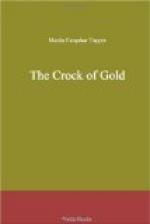So, then, the embers were raked up, the trivet stuck a-top, the savoury broil made ready; and (all but Grace, who would not taste a morsel, but went up straight to bed) never had the Actons yet sate down before so rich a supper.
CHAPTER X.
Ben Burke’s strange adventure.
“Take a pull, Roger, and pass the flask,” was the cordial prescription of Ben Burke, intended to cure a dead silence, generated equally of eager appetites and self-accusing consciences; so saying, he produced a quart wicker-bottle, which enshrined, according to his testimony, “summut short, the right stuff, stinging strong, that had never seen the face of a wishy-washy ’ciseman.” But Roger touched it sparingly, for the vaunted nectar positively burnt his swallow: till Ben, pulling at it heartily himself, by way of giving moral precept the full benefit of a good example, taught Roger not to be afraid of it, and so the flask was drained.
Under such communicative influence, Acton’s tale of sorrows and oppressions, we may readily believe, was soon made known; and as readily, that it moved Ben’s indignant and gigantic sympathies to an extent of imprecation on the eyes, timbers, and psychological existence of Mr. Jennings, very little edifying. One thing, however, made amends for the license of his tongue; the evident sincerity and warmth with which his coarse but kindly nature proffered instant aid, both offensive and defensive.
“It’s a black and burning shame, Honest Roger, and right shall have his own, somehow, while Big Ben has a heart in the old place, and a hand to help his friend.” And the poacher having dealt his own broad breast a blow that would have knocked a tailor down, stretched out to Acton the huge hand that had inflicted it.
“More than that, Roger—hark to this, man!” and, as he slapped his breeches pocket, there was the chink as of a mine of money shaken to its foundations: “hark to this, man! and more than hark, have! Here, good wife, hold your apron!” And he flung into her lap a handful of silver.
Roger gave a sudden shout of wonder, joy, and avarice: and then as instantaneously turning very pale, he slowly muttered, “Hush, Ben! is it bloody money?” and almost shrieked as he added, “and my poor boy Tom, too, with you! God-a-mercy, mun! how came ye by it?”
“Honestly, neighbour, leastways, middling honest: don’t damp a good fellow’s heart, when he means to serve you.”
“Tell me only that my boy is innocent!—and the money—yes, yes, I’ll keep the money;” for his wife seemed to be pushing it from her at the thought.
“I innocent, father! I never know’d till this minute that Ben had any blunt at all—did I, Ben?—and I only brought him and Rover here to sup, because I thought it neighbourly and kind-like.”
Poor Tom had till now been very silent: some how the pheasants lay heavy on his stomach.




